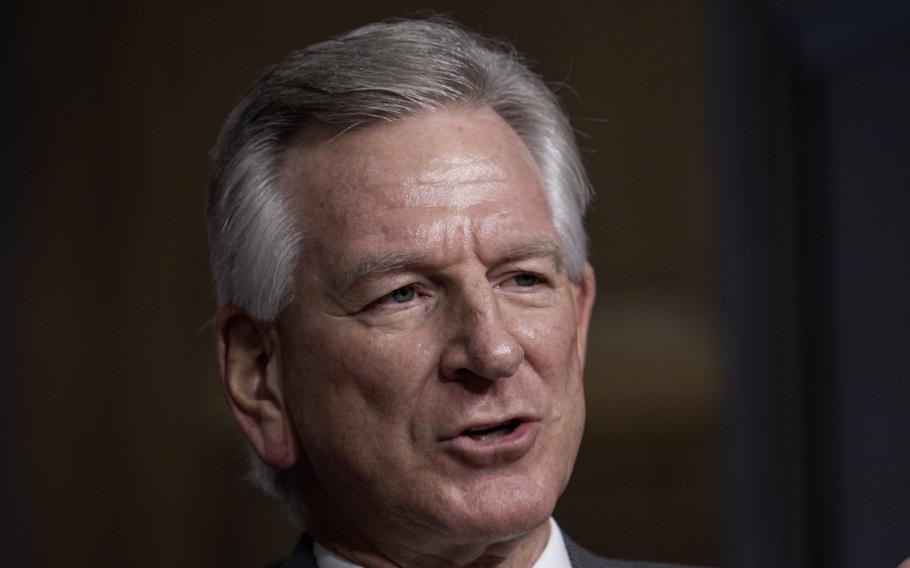
Sen. Tommy Tuberville, R-Ala., attends a Senate Armed Services Committee hearing on Capitol Hill in Washington on Tuesday, July 11, 2023. (Carlos Bongioanni/Stars and Stripes)
WASHINGTON — Sen. Tommy Tuberville announced Tuesday that he will lift the bulk of his monthslong hold on military nominees, clearing the way for more than 400 promotions.
Tuberville said he will no longer stand in the way of promoting military officers at the three-star level and below but will still block about a dozen four-star generals and admirals in continuation of his protest against the Pentagon’s abortion access policy.
“I’m not going to hold the promotions of these people any longer,” Tuberville, R-Ala., told reporters. “We fought hard. We did the right thing for the unborn and for our military, fighting back against executive overreach and an abortion policy.”
The decision is set to end a 10-month standoff between Tuberville and the Defense Department, which has refused to rescind a policy that provides service members with time off and travel reimbursement for reproductive health care.
Tuberville had argued the policy violates federal law and insisted he would not end his block unless the Defense Department caved to his demands.
More than 40% of female service members stationed in the United States have no access, or severely restricted access, to abortion services following a Supreme Court ruling last year that eliminated the constitutional right to an abortion, according to the Rand Corp. think tank.
The unusual length of Tuberville’s blockade and its widening impact prompted some fellow Republicans in recent months to press the senator to back down. Pentagon officials said Tuberville’s actions harmed national security and affected readiness amid war in Ukraine and the Middle East.
Tuberville said Tuesday that his decision to allow the confirmation of hundreds of lower-level nominees was inspired by Sens. Dan Sullivan, R-Alaska, and Joni Ernst, R-Iowa. Both had spent hours on the Senate floor attempting to approve nominees.
Senate Democrats, meanwhile, started moving forward with a resolution that would temporarily give the upper chamber power to bypass Tuberville’s blockade.
Tuberville’s hold meant the Senate could not confirm blocks of nominees via voice vote, as it normally does, and would have to vote on each promotion one by one. The process of holding individual roll call votes would have eaten up at least 700 hours of floor time, according to the Congressional Research Service.
The Senate was forced to individually confirm some of the military’s highest-ranking officers, including five members of the Joint Chiefs of Staff, earlier this year due to Tuberville’s blockade. A second-in-command for the Marine Corps was hurriedly confirmed last month after the service’s commandant suffered a cardiac arrest.
Tuberville said he did not regret his blockade and described the outcome of his protest on Tuesday as a “draw.”
“They didn’t get what they wanted,” he said. “We didn’t get what I wanted.”
Tuberville said he will continue to hold the promotion of officers slated to become four-star generals. Those positions include the commanders of Northern Command and Cyber Command, the vice chiefs of staff of the Army, Navy, Air Force and Space Force, and commanders of the U.S. Pacific Fleet and the Pacific Air Forces.
Sen. Jack Reed, D-R.I., the chairman of the Senate Armed Services Committee, said Tuberville’s hold had ensnared 445 officers. He called the blockade “an affront” to the military and the Senate.
“No senator should ever attempt to advance their own partisan agenda on the backs of our troops like this again,” he said.
Air Force Brig. Gen. Pat Ryder, the top Pentagon spokesman, said Tuesday that it will take time to unravel the organizational problems created by Tuberville’s hold and put everyone where they need to be. Some officers were forced to work two jobs as vacancies were not filled.
“It’s not just flicking a switch and suddenly everyone moves into these new positions,” Ryder said. “You have to consider things like when people can move, where the people moving out of positions are going and so all that has to be carefully orchestrated.”
Sen. Mark Kelly, D-Ariz., a Navy combat veteran, summed up his reaction to Tuberville’s capitulation in just three words: “About damn time.”